Verdi: Un Ballo in Maschera (López Cobos)
Introduction
Verdi certainly didn't make things easy for himself when selecting subjects for his operas. He was a highly political animal, who hated corruption within the upper eschelons of society (although still thought it was a good idea to keep them), and was one of many composers to take up a play by Augustin Eugène Scribe, based on the assassination of King Gustav III of Sweden in 1792.
Perhaps it was because Verdi himself had finally taken up this particular challenge that the Italian censors went into overdrive, demanding libretto rewrites until the orginal story was almost unrecognisable. It was certainly going to be trouble depicting the murder of a recognisable European monarch on stage, let alone show him as having feelings for someone below his station and consulting a fortune-teller, even if it was just for a laugh.
The initial version of the opera consequently reduced the King's rank to Duke, and moved the setting to Pomerania, but eventually the plot was moved away from Europe altogether, finally taking place in the British-American colonies and the Duke was demoted to Governor. This was much better for the status quo, although as everyone knows the original story and the royal functions and paraphernalia remain within the dramatic structure, the plot is often 'updated' to the original scenario.....but not here.
So, the story is as follows:
Riccardo (The Earl of Warwick, and governor of Boston) is holding a public audience. First on the agenda is the list of guests who will be attending a masked ball he is holding. Riccardo is rather please to see that Amelia is coming along, as he is quite smitten with her. Unfortunately, she is the wife of his best friend, and most trusted companion, Renato.
Renato arrives and takes Riccardo aside, informing him of a plot to kill him, but Riccardo isn't too worried about such things.
Next on the list is a proposal to banish a black fortune-teller named Ulrica as she is highly likely to be engaged in witchcraft, communions with Satan and other such things. Riccardo dismisses this idea immediately, and suggests that he and those around him should disguise themselves and pay Ulrica a visit.
Riccardo isn't taking this fortune-telling stuff seriously, making sure a hastily arranged promotion is given to a sailor who has just been told that such a thing may well happen to him. The crowd love it.
Amelia makes an appearance, and Ulrica sends everyone away, but Riccardo hides himself so he can hear. He is delighted to find out that she has feelings for him too, but she is asking for a way out of the trouble that can only come from having such feelings. Ulrica suggests she collects a herb which may be found under the local town gallows...at night. The reasons for this are not specified.
Once Amelia has gone, everyone reconvenes and Riccardo tries his own luck with Ulrica. She can see that he is a nobleman of some sort, and adds that he will be killed by the person who nexts shakes his hand.
Renato arrives and greets Riccardo with a warm handshake and so the disguise is dropped and their is general rejoicing of the sort that often greets the end of an Act.
Amelia has gone to collect the herb, and Riccardo has made a point of bumping into her. They both finally declare their love for each other, but are interrrupted by Renato, who tells Riccardo the conspirators are on their way and so he would be well advised to be somewhere else very quickly. Amelia throws a veil over her face just in time, and Riccardo orders Renato to escort her to safety but without asking who she is.
Riccardo runs off, the conspirators catch up with Renato and Amelia. Her veil drops.
Renato asks Sam and Tom, the two leaders of the conspiracy, to meet up him the following day. In the meantime, Renato has decided his wife should die, although before he kills her, she pleads for mercy so she can see their son once more. He relents, and changes his mind about who gets killed. Riccardo is in for a shock.
Sam and Tom arrive, and are surprised to find out that Renato wants to join the conspiracy, and not a little annoyed to discover that he demands to be the one who kills Riccardo, promising to hand over his own son to be murdered if he doesn't carry things through to the end.
In the end, lots are drawn to see who gets the honour, and Amelia has to pick. Renato is the winner, and it's decided that the best place to carry out the assassination is the upcoming ball.
Riccardo has decided to do the honourable thing and renounce his love for Amelia, making sure her and Renato are packed off back to England, and for good measure, Renato will also be promoted into a lucrative and powerful job.
This is all too late though, as when Renato finally manages to work out which of the attendees at the ball is actually Riccardo, he takes little time in plunging a knife into him.
Before dying, Riccardo explains to all that Amelia's honour is still in tact, hands Renato the letter of commission, and forgives everyone.
Audio & Visual
Fantastic detail from within the pit, coupled with excellent balance with the goings-on on stage make this one of the best 'big' opera recordings I've heard from Opus Arte.
The video quality is also excellent, especially during the night-time scenes, where there is no problem with the 'blotchiness' which can sometimes accompany such scenes. Colours are nice and vivid, and the fantastic lighting from David Harvey is conveyed brilliantly, especially in the wonderfully mirky dark blue of Act II.
Extras
Sadly, nothing apart from the usual illustrated synopsis and cast gallery on the disc itself, and within the booklet, a rather opaque essay from Pierluigi Petrobelli, which I assume was translated from the original Italian.
Probably best to note here that the subtitles don't always match what we are seeing on the stage, as is the problem with productions that don't follow the plot to the letter. Small examples are the gun Renato pulls on the conspirators after threatening them with the sword, and the complete lack of 'pink sash' on Riccardo's person, despite the fact that it is this which is supposed to distinguish him from the other dancers at the ball.
Conclusion
I have to say straight away that this is one of the finest versions of this opera I've seen, despite having little or no idea as to when things are supposed to be taking place in this production, mostly because of what appear to be costumes from all ages appearing throughout the production, although I'm quite happy to be corrected.
Having said that, the designs of both costumes and staging are hugely impessive, and I was particularly struck by the Act 2 gallows area (beautifully lit) and the mirror effects in Act 3, but these may have been seemed more fulfilling by the lack of much on stage at all during the more 'conversational' scenes.
Musically, things are paced with great expertise by López Cobos, but there are times when his tempi are not necessarily picked up immediately from the stage, especially by the male members of the chorus at the beginning of Act III. It's a hard score to balance well considering Verdi's quite inventive orchestration, but the Madrid SO have no trouble, and play brilliantly throughout.
Singing and acting-wise, things are generally superb, with the only irritations coming from Elena Zaremba's (Ulrica) overly wide vibrato and the chorus, who appear to be unable to react to anything that's going on in front of them with much enthusiasm.
The highlights are many, and come principally from Violeta Urmana (Amelia) who, although not having as much 'oomph' as you would want toward the top of the range in this role, posseses a clear, pure and quite beautiful voice which stops you in your tracks, notably in 'Ma dall'arido…'.
Marcelo Ãlvarez is her equal as the lovelorn Governor, Riccardo. His voice is bright and strong, and lasted well, easily beating Pavarotti's 1990's Metropolitan Opera appearance (which I think may still be available on DVD).
Renato is sung by the excellent Marco Vratogna who has a great depth and sincerity to his voice and raises the roof with his vow to kill Riccardo in the second half.
Having mentioned Elena Zaremba's vibrato, it would be unfair not to say that you rarely hear singers who can comfortably reach the full range of this difficult role, and her lower notes are remarkably strong and rich.
Alessandra Marianelli, who was only 22 or so at the time of recording, produces a bight and vivacious Oscar as she (mostly) manages the frighteningly difficult musical lines. This, and actually being able to act well while doing so will make her someone to watch closely over the next few years.
So, a great production on stage, and matched by great sound and video on the disc, but let down by quite severely by the lack of extras. Even so, you could do much worse than adding this to your collection if you're already familiar with the opera, as it's one of the most satisfying versions around.
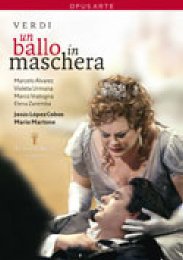
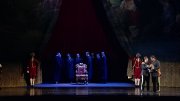
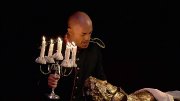
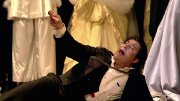
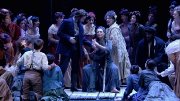

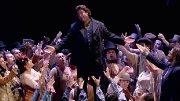
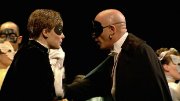
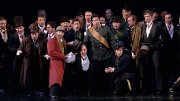
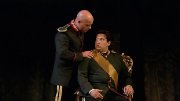





































Your Opinions and Comments
Be the first to post a comment!